Isaak August Dorner Collection (12 vols.)
Digital Logos Edition
This product has been transferred from Community Pricing to Pre-Pub. The actual funding level may be lower than it appears, which could delay production. The amount of funding still needed will be evaluated and updated soon.
Overview
Nineteenth century Lutheran Church leader Isaak August Dorner traced the roots of doctrine in a way never seen before. In his major works, History of the Development of the Doctrine of the Person of Christ and A System of Christian Doctrine, Dorner presents historical evidence and philosophical proofs for Christian doctrine as they were understood in his time. He tracks important theological ideas back to their conception and identifies their contribution to Christian theology as a whole.
In the Logos Bible Software editions, these volumes deepen your research like never before. Bible verses appear on mouseover, and important terms and concepts appear at the click of a mouse. Every volume in the Isaak August Dorner Collection is fully searchable, giving you instant access to every mention of “trinity” or “Luther.”
Key Features
- Presents fair, unbiased Protestant history and doctrine
- Provides a unique, comprehensive history of Christian theological thought
- Gives accurate translations from the original German
Praise for Isaak August Dorner
Dorner’s critique still has its importance for the discussion on christology.
—Wolfhart Pannenberg, professor of systematic theology, University of Munich
Dr. Dorner was one of the profoundest and most learned theologians of the nineteenth century.
—David S. Schaff, professor of church history, Lane Theological Seminary
One of the greatest modern divines and teachers of Germany.
—History of German Theology in the Nineteenth Century
Product Details
- Title: Isaak August Dorner Collection
- Author: Isaak August Dorner
- Publisher: T&T Clark, Scribner & Welford
- Volumes: 10
- Pages: 5,822
Individual Titles
- A System of Christian Doctrine, vol. 1, by Isaak August Dorner
- A System of Christian Doctrine, vol. 2, by Isaak August Dorner
- A System of Christian Doctrine, vol. 3, by Isaak August Dorner
- A System of Christian Doctrine, vol. 4, by Isaak August Dorner
- System of Christian Ethics by Isaak August Dorner
- History of the Development of the Doctrine of the Person of Christ, part 1, vol. 1, by Isaak August Dorner
- History of the Development of the Doctrine of the Person of Christ, part 1, vol. 2, by Isaak August Dorner
- History of the Development of the Doctrine of the Person of Christ, part 2, vol. 1, by Isaak August Dorner
- History of the Development of the Doctrine of the Person of Christ, part 2, vol. 2, by Isaak August Dorner
- History of the Development of the Doctrine of the Person of Christ, part 2, vol. 3, by Isaak August Dorner
- History of Protestant Theology, vol. 1, by Isaak August Dorner
- History of Protestant Theology, vol. 2, by Isaak August Dorner
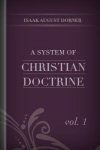
Acknowledged Isaak A. Dorner’s masterpiece, A System of Christian Doctrine is a colossal systematic theology on doctrines of Protestant belief. This first volume covers doctrine concerning two topics: faith and God. Dorner delivers a unique perspective on doctrinal theology, establishing Christian beliefs in comparison with—and distinct from—traditions and beliefs practiced according to other world religions. As if an apologist, Dorner develops Christian theology to stand above, and apart from, other religions.
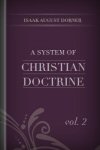
The second volume in Dorner’s massive doctrine on Christianity, this volume covers the complex doctrine of the trinity of God, the nature of man, and finally, the unity of God and man. At the end of this volume, Dorner begins his discourse on the doctrines of sin and salvation.
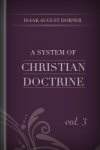
This third volume of Dorner’s A System of Christian Doctrine concludes the doctrine on sin and discusses the doctrine of Christ.
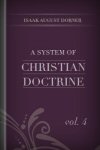
The final volume of Dorner’s exhaustive doctrine of Christianity deals with the doctrines of Christ and the church.
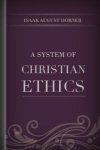
This doctrinal theology of ethics was originally intended to be split into two parts as a sequel to A System of Christian Doctrine. Edited and published posthumously, System of Christian Ethics is a complete and standalone work that addresses dogmatic ethics and morality, creating a complete system in the framework of Christianity as established by Scripture and hundreds of Christian philosophers before Dorner.
Dorner’s system of Christian ethics is built upon his great monumental work on doctrine. . . . another great work that Germany has produced, on a subject that scarcely receives the attention it deserves from English theologians. Indeed, we cannot name any book of really high merit on Christian ethics produced by an English theological writer. . .
—The British Quarterly Review, vol. 83
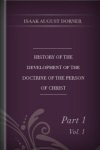
These five volumes comprise a gargantuan history of the theologians and writers who have contributed to the theology of Christ. Containing not only commentary on theologians and their works but also a look at church history and the shaping of doctrine, these volumes present substantial evidence supporting early doctrines of the person of Christ.
Volume one of part one covers the shaping of this doctrine up until AD 180.
‘The work of Dr Dorner will be found peculiarly to excel exactly where these most fail. Purely scientific in its character, and the result of long and patient study of the original sources, it supplies a comprehensive, impartial, and exhaustive survey of the whole subject of which it treats. The author preserves throughout the tone of a judge, calmly and perspicuously weighing all the evidence that can be brought to bear on the case; patiently collecting every particle of evidence pertaining to the subject; and pronouncing his decision without regard to polemical considerations, or the interests of parties.’
—from the preface
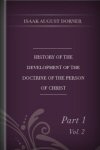
Volume two of part one covers the history of the shaping of this doctrine from AD 180 to 381.
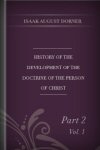
Volume one of part two expands from AD 381 to 1483.
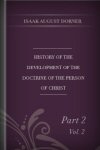
Volume two of part two primarily deals with Martin Luther and the Reformation Era, from AD 1483 to 1750.
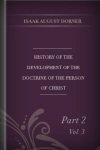
The final volume is concerned with the years leading up to its publication, from AD 1750 to 1890.
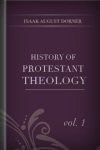
After Dorner published History of the Development of the Doctrine of the Person of Christ, his success as a theological historian was secured—and was recognized when the Historical Commission of the Royal Academy of Sciences commissioned him to write a history of Protestant theology. In these two volumes, the History of Protestant Theology expresses Dorner’s deep and meditative knowledge on Protestant theology as it was developed, specifically in Germany. His knowledge from his experience travelling among historical churches and cathedrals in Germany, as well as his experience teaching throughout Germany, brings invaluable insight to his abounding knowledge of the history of Protestant theology.
This first volume deals with the pre-Reformation period, the Middle-Ages, and the development of Protestant theology through the late 1600s.
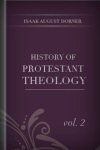
The second volume of Dorner’s History of Protestant Theology deals with the development of Protestant theology from the 1600s until the late 1800s.
About Isaak August Dorner
Isaak August Dorner (1809–1884) was a German theologian and professor. He was educated at the University of Tübingen and Maulbronn. He travelled widely throughout Europe, learning theology and pastoral ministry from his father during their travels. After writing History of the Development of the Doctrine of the Person of Christ, he was invited to teach at Kiel, where he continued to write. From there, he moved from university to university, teaching at Königsberg, Bonn, and Göttingen. His son, August Dorner, also became a theologian and church leader.
Reviews
2 ratings

Rev. Dr. M. Raeburn Johnston
8/10/2021
A tremendous scholastic counterbalance to the Tubingen school regarding the person and work of Christ. These volumes are difficult to find and the LOGOS research advantage is without parallel. For anyone researching the history of Christian thought this is an essential purchase.
Timothy Jang
9/25/2014